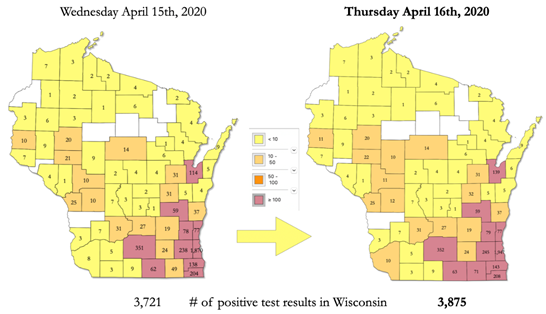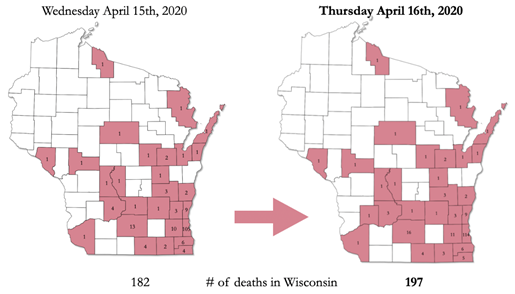Arkansas
As of April 16th
There are 1620 confirmed cases of COVID-19 in Arkansas. 14,803 business in Arkansas received a total of US$2.1 billion in funding through the PPP program.
Connecticut
As of April 17th
Data updates on COVID-19 testing in Connecticut
Since yesterday’s update, an additional 1,129 positive COVID-19 cases have been reported in Connecticut, bringing the statewide total to 15,884. To date, more than 53,122 patients have been tested in Connecticut. Approximately 1,926 patients are hospitalized. The total number of COVID-19 associated fatalities statewide is 971.
Connecticut Department of Labor processed 60,000 unemployment claims Weds. night utilizing new software improvements
The Connecticut Department of Labor successfully processed 60,000 unemployment claims on Wednesday night utilizing the new software improvements the agency deployed in response to the overwhelming surge in claim applications resulting from the COVID-19 pandemic. Additional claims will continue to be processed through this new system, helping to expedite the process.
Since March 13th, the department received more than 350,000 applications, nearly the same amount that it typically receives over a two-year period. Approximately 174,000 of those applications had already been manually processed prior to the deployment of yesterday’s software improvements. Paired with the continued manual processing, the originally anticipated six-week wait period is expected to be shortened to one week or less.
Georgia
As of April 17th
Daily State Public Health stats: State cases are up to 17,194 confirmed cases as compared to 16,638 Thursday at 7p.m., with 3,324 hospitalized patients as compared to 3,260 Thursday at 7p.m., and 650 deaths as compared to 617 deaths Thursday at 7p.m. The State reported an additional 41 deaths yesterday. In the past 10 days, deaths have more than doubled.
- IHME predicts that Georgia will now peak on May 1 with 91 deaths on May 3. IHME predicts a shortage of 218 ICU beds and 715 ventilators [both numbers less than before].
- GA Department of Labor processed over 861,000 unemployment claims since March 14, which accounts for about 10 percent of the state’s population. Claims could top 1 million by the end of today.
- Georgia’s ports are feeling the impact of the virus with a more than 18 percent drop in activity in March.
- Georgia State University fiscal researchers say the state and local governments could see up to a US$1.27 billion loss in sales tax revenue from key sectors of the economy this year because of the coronavirus shutdown and its aftermath.
Iowa
As of April 17th
Iowa schools canceled for remainder of school year due to coronavirus
Gov. Kim Reynolds announced Friday that Iowa schools, which had been set to open on May 1, will stay closed for the remainder of the school year as coronavirus cases in the state climbed.
Reynolds made the decision to close schools for the rest of the semester based on data from the Iowa Department of Public Health. By Friday, the state had registered 64 deaths due to coronavirus.
“Believe me, I would like nothing more than to stand before you today and announce that Iowa will be open for school in May,” Reynolds said.
The Governor said she could not say with certainty, considering the public health department’s data, that early May would be the right time for students, teachers, and staff to be together again in classrooms. The closure also applies to the spring sports season.
“Closing schools to the end of the year is not an easy decision, and we do know the challenges this creates, but we also know this decision is necessary to ensure the health and safety of those we serve,” said Iowa Department of Education Director Ann Lebo.
Iowa’s 327 public school districts and 179 nonpublic schools have been required to report what they are doing to provide continuous learning for students until the end of the scheduled school year, even while they are closed.
Many have shifted learning to online platforms, but there have been concerns about access to broadband internet in rural areas and computers or devices for students in lower-income households. Lebo praised school leaders and staff for quickly transitioning to serve students in just a matter of weeks.
Both the late August school start date and requirements for instructional hours for schools have been waived, allowing districts to make local decisions about the academic school year.
Schools will be required to submit a “return to learn” plan by July 1, which could include options for summer school, enrichment activities or other activities designed to address disruptions to learning.
“As we find our way forward” Lebo said, “robust, engaging options for learning outside of brick and mortar will become an integral part of our educational framework, complementing face-to-face learning and preparing students for the increasingly digital world they live in.”
Gov. Kim Reynolds announces widespread coronavirus testing, restrictions amid outbreaks
The state of Iowa will ramp up testing for the prevalence of coronavirus in the wake of outbreaks in meatpacking plants and long-term care facilities.
Iowa Gov. Kim Reynolds on Thursday announced new restrictions on gatherings in the northeast corner of the state, where a spate of new coronavirus cases occurred this week.
Effective Thursday night, all community and social gatherings, and recreation, leisure or sporting activities were banned in the region, except with other immediate household members. Exceptions were made for weddings, funerals, and other religious gatherings, which will continue to be restricted to 10 people or fewer. The restriction is to remain in place through April 30.
The order includes the major Iowa urban areas of Cedar Rapids, Waterloo, and Dubuque, and encompasses the counties of Allamakee, Benton, Black Hawk, Bremer, Buchanan, Clayton, Delaware, Dubuque, Fayette, Grundy, Howard, Jones, Linn, and Winneshiek.
Outbreaks have been detected in Tyson plants in Columbus Junction and Waterloo. They’ve also hit long-term care facilities particularly hard, with nine centers reporting outbreaks.
Reynolds announced the Test Iowa initiative, which will allow for largescale testing and contact tracing around the state. It will also send dedicated “strike teams” of nurses to large businesses or facilities where outbreaks are occurring or anticipated to conduct surveillance testing. Prevention teams will provide outreach to law enforcement and large businesses.
“Increased testing at this time is critical, to not only targeting virus activity and identifying potential risk, but also in implementing specific measures to slow the spread within a facility, business or community,” Reynolds said. “And also, it’s going to be critical in making decisions to re-open up our state.”
The program will allow the state to increase testing capacity by 3,000 additional tests per day. The administration is currently developing an operational plan to deploy additional testing. Efforts already include targeted surveillance testing at long-term care facilities.
The program also will allow a serology testing to detect antibodies for coronavirus that are present if an individual has had the virus and recovered.
“COVID-19 is now part of our life, but it will not always dictate how we live,” Reynolds said.
Reynolds unveiled a public service announcement featuring Iowa native Ashton Kutcher encouraging Iowans to stay at home during the pandemic.
State rolls out new coronavirus dashboard
State officials this week introduced a new public dashboard tracking coronavirus cases and deaths by county, as well as the medical resources available, including ICU beds and ventilators. The number of tests conducted in each county is also included in the data.
The dashboard can be accessed here.
Iowa’s US senators discuss new round of relief for Main Street, individuals
Iowa’s two US senators updated business leaders on federal COVID-19 relief efforts Thursday morning during a teleconference organized by the Greater Des Moines Partnership.
Sen. Chuck Grassley, a Republican who chairs the Senate Finance Committee, said close to 170 million Americans will receive federal payments to support their families through the pandemic. Those whose direct deposit information had previously been shared with the IRS were the first to get payments. Americans receiving checks instead of direct deposit will have to wait weeks for them to arrive, with about 5 million checks being sent each week.
Grassley noted the small business loan program was out of money and wanted Congress to act quickly to continue the program.
Of the US$150 billion in federal relief for hospitals, as of last week, only US$30 billion has been released, Grassley said. Another US$150 billion was headed to state governments for coronavirus mitigation.
US Sen. Joni Ernst would like to see federal dollars go toward infrastructure projects through the FAST ACT, which was already pending in Congress before the pandemic struck.
“This would be important to virtually every sector of business for the state of Iowa,” Ernst said of federal infrastructure spending. She cited rural broadband expansion, which has long been an issue in rural Iowa, as a priority.
Date Iowa Legislature will reconvene remains unclear
The Legislature was set to reconvene April 30, but that return date is looking less likely as the coronavirus continues to impact Iowa residents. With businesses shuttered and workers claiming unemployment, state revenues from sales and income taxes are expected to dive sharply, but by how much is unknown at this time.
The fact that many rural lawmakers are farmers facing planting season in the coming weeks, including House Speaker Pat Grassley, complicates matters further.
Gov. Reynolds has issued a proclamation that allows spending to carry into August without legislative approval, giving lawmakers some space even into the next fiscal year, which begins July 1.
Legislative leaders have been continually re-assessing when they might return to the Capitol to continue the legislative session but have not announced a definitive return date.
Kansas
As of April 17th
Kansas Governor Laura Kelly extended the state’s stay-at-home order to May 3, 2020. The official Executive Order was released this evening and can be found here. According to Senator Carolyn McGinn and Representative Troy Waymaster, budget committees would be meeting digitally next week. The Senate will meet on April 23rd beginning at 9 AM. The House will meet on April 24th beginning at 9 AM. It is the goal of both committee chairs to do some work on an omnibus budget prior to the full Legislature convening again.
Missouri
As of April 16th
Missouri is now reporting 5,111 cases of coronavirus and 152 deaths. One week ago, we were at 3,539 cases and 77 deaths.
Stay-at-Home Orders
Governor Parson extended Missouri’s stay-at-home order to May 3. His original order was set to expire on April 24. He took this action in collaboration with Kansas Governor Laura Kelly. Governor Parson pledged that the first phase of reopening Missouri’s economy will begin on May 4.
St. Louis County Executive Sam Page and St. Louis Mayor Lyda Krewson extended their orders indefinitely. They have both promised to revisit them in mid-May. Kansas City Mayor Quinton Lucas extended his stay-at-home order to May 15. Local orders cannot be less restrictive than the statewide order but can be more restrictive.
The General Assembly will return on April 27
House and Senate leadership issued a statement on April 15 announcing that the General Assembly will be returning to the Capitol on April 27. The statement made clear that the legislature will pass a Fiscal Year 2021 budget before the constitutional deadline of May 8. Legislators are bracing for approximately one billion dollars in cuts to the US$30 billion budget. The last time a budget cut of that size was needed was during the Great Recession in 2009.
Because the full effects of the coronavirus on Missouri’s economy are still unknown, it is highly likely the budget passed in the next few weeks will need adjustments. These adjustments would be made during at least one special session this summer or fall.
It is also anticipated that a handful of non-budgetary items will be debated when session restarts. Negotiations between the two chambers to determine what those items will be are ongoing. Some items we expect to see tackled include tort reform and the establishment of a prescription drug monitoring program.
Missouri is one of two states that do not require the collection of sales taxes for online purchases. The abrupt shift in our economy to online sales over the last month has highlighted the need to adopt this legislation, but we have seen no indication that conservative Republican and Democrat senators are any closer to an agreement on what those newly collected revenues should be spent on than they were when the General Assembly recessed last month.
Other Actions
Governor Parson established an informal working group to help make recommendations on the best use of the federal COVID-19 aid. State Treasurer Scott Fitzpatrick will lead the group.
The Division of Alcohol and Tobacco Control will temporarily (until May 15) allow Missouri restaurants and bars to sell mixed alcoholic beverages in to-go containers, as long as food is also purchased.
Virginia
As of April 17th
- Total cases: 7,491
- Hospitalizations: 1,221
- Deaths: 231
The latest
- Gov. Ralph Northam issued Executive Order No. 57, easing restrictions on telemedicine, nurse practitioners and doctors licensed to practice in other states.
- A group of demonstrators protested Northam’s stay-at-home orders and other restrictions on Thursday outside the governor’s mansion.
- Virginia has received US$1.6 billion in federal aid, which will be distributed to local governments, and authorization from FEMA to use hotel rooms for first-responders.
Gov. Ralph Northam said Friday that Virginia will follow a phased approach to restarting economic activity consistent with the guidelines released Thursday by President Donald Trump.
That process, Northam said, will be based on data, involve consultations with governors in neighboring states and the District of Columbia, and begin after Virginia posts a downward trend in positive cases for 14 days, a benchmark that the state has not yet reached. Confirmed cases of COVID-19 increased by nearly 1,000 over the previous two days.
Meanwhile, Northam announced he had signed another executive order allowing for greater use of telemedicine to ease the burden on Virginia’s healthcare system. The order also relaxes restrictions on nurse practitioners and provides more flexibility for doctors licensed in other states to practice at Virginia facilities. The first shipment of personal protective gear – 24,000 N95 masks, as well as gowns and gloves – secured through the state’s recent US$27 million contract with manufacturer Northfield Medical was being distributed to Virginia hospitals, with additional shipments expected in coming weeks, the governor said.
Non-essential businesses in Virginia – including indoor recreation and entertainment businesses, hair salons, and barber shops, museums and fitness centers – will remain closed until May 8, and a stay-at-home order remains in effect until June 10. Public schools are closed for the rest of the academic year.
About 50 people gathered Thursday near the governor’s mansion at Capitol Square to protest Northam’s response. The governor dismissed the demonstration, saying Friday that participants had put themselves and others at risk and that social distancing efforts were working as intended to slow the spread of COVID-19.
Unemployment
Nearly 105,000 Virginians filed initial claims for unemployment benefits in the week ending April 11, according to data from the Virginia Employment Commission. The figure represents a slight decrease from the week ending April 4, which may have represented the peak for filings. The four-week total of initial claims registered at 410,762, with the majority of those Virginians working in the accommodation and food services industries. Other heavily affected industries include retail and healthcare, which have led to younger workers and female workers being disproportionally impacted, the commission said.
Legislative session
State legislators are set to reconvene in Richmond on Wednesday, April 22, to consider the governor’s amendments to the budget and other bills, including his decision to delay a minimum wage hike and the ability of local government employees to unionize until May 2021. The governor’s budget amendments include striking about US$2 billion in proposed new spending over the biennium as the pandemic rendered revenue forecasts useless and caused economic activity to collapse.
The House of Delegates plans to reconvene outside the state Capitol; the Senate is scheduled to meet at the Science Museum of Virginia. Officials are evaluating whether to hold the session remotely and use electronic voting .
Among the bills signed by the governor:
- The Virginia Clean Economy Act, which trades higher consumer electricity bills in exchange for the early retirement of coal plants, greater use of renewable energy and a carbon-free electricity grid by 2050.
- The Clean Energy and Community Flood Preparedness Act, which establishes a carbon dioxide cap-and-trade program and a low-interest loan program to help communities deal with recurrent flooding.
- House Bill 1537, which authorizes localities to remove Confederate monuments.
- House Bill 972, which decriminalizes simple possession of marijuana and assesses a US$25 civil penalty.
The governor also approved making Election Day a state holiday, expanded early and absentee voting, and repealed voter ID requirements; proposed delaying a ban on electronic skill games and instead taxing their profits, a move that is expected to generate up to US$150 million in annual revenue if legislators agree to it; expanded parole eligibility; and announced a budget amendment allowing for the release of qualifying inmates with less than a year remaining on their sentence, a step that criminal justice reform advocates have urged in response to the spread of the novel coronavirus.
Upcoming elections
Legislators also will consider a proposal that pushes next month’s municipal elections to November as a result of the COVID-19 pandemic. Existing law authorizes the governor to delay primary elections by two weeks, and Northam has already announced he is exercising that authority with respect to congressional primaries scheduled for June 9. Those elections will now be held on June 23.
Wisconsin
As of April 16th
Gov. Evers extends Safer-At-Home
Today Wisconsin Governor Tony Evers directed Wisconsin Department of Health Services (DHS) Secretary-designee Andrea Palm to extend the Safer at Home order from April 24, 2020 to 8 a.m. Tuesday, May 26, 2020, or until a superseding order is issued. The order, Emergency Order #28, makes a couple notable changes:
- Schools: Public and private K-12 schools will remain closed for the remainder of the 2019-2020 school year.
- Local parks and open space: Local health officials may close public parks and open spaces if it becomes too difficult to ensure social distancing or the areas are being mistreated.
- Travel: People are strongly encourage to stay close to home, not travel to second homes or cabins, and not to travel out-of-state if it is not necessary.
- Tribal Nations: Tribal Nations are sovereign over their territory and can impose their own restrictions. Non-tribal members should be respectful of and avoid non-essential travel to Tribal territory. Local government must coordinate, collaborate, and share information with Tribal Nations.
- Golf courses: Golf courses may open again, with restrictions including scheduling and paying for tee time online or by phone only. Clubhouses and pro shops must remain closed.
- Non-essential Businesses: Non-essential businesses will now be able to do more things as Minimum Basic Operations, including deliveries, mailings, and curb-side pick-up. Non-essential businesses must notify workers of whether they are necessary for the Minimum Basic Operations.
In order to extend the Safer At Home beyond the Governor’s 60-day authority under a declared emergency, DHS Secretary-designee Palm is using her broad authority to control communicable diseases under Wis. Stat. § 252.02. This authority is independent of the authority of the governor to declare a state of emergency related to public health under Wis. Stat. § 323.10.
The Legislative Reference Bureau memo, The First 30 Days: The COVID-19 Public Health Emergency in Wisconsin, outlines the Secretary of Health’s authority:
Specifically, Wis. Stat. § 252.02 (3) allows DHS to close schools and forbid public gatherings in schools, churches, and other places to control outbreaks and epidemics. Wis. Stat. § 252.02 (6) allows DHS also to “authorize and implement all emergency measures necessary to control communicable diseases.”
The purpose of a measure taken under Wis. Stat. § 252.02 (3) must be to control outbreaks and epidemics, whereas the purpose of a measure taken under Wis. Stat. § 252.02 (6) must be to control communicable diseases. The statutes do not define “communicable disease” but instead defer to DHS, which specifies a list of diseases that are communicable. Nor do the statutes define “epidemic” and “outbreak,” but a DHS rule defines an “outbreak” to be an “unusual aggregation of health events that are grouped together in a short time period and limited geographic area.” Defining an event as an outbreak or epidemic, although significant, does not require the same risk of the degree of harm required by the public health emergency under Wis. Stat. § 323.10. Therefore, DHS’s authority under Wis. Stat. § 252.02 has a lower threshold than that of the public health emergency finding required under Wis. Stat. § 323.10.
DHS may exercise its authority under Wis. Stat. § 252.02 in the absence of any state of emergency declaration by the governor. The authority of DHS, therefore, does not automatically expire with the expiration of the state of emergency under Wis. Stat. § 323.10.
To date, the governor and the secretary-designee of health services have invoked the powers of DHS under Wis. Stat. § 252.02 in issuing the following orders: Emergency Orders 6, 12 (which supersedes Emergency Orders 1, 4, 5, and 8), 14, 15, 16, 18, 19, 20, and 21.
Reaction to Governor Evers’ Extension of Safer-At-Home
Senate Majority Leader Scott Fitzgerald (R-Juneau) released the following statement today reacting to the governor’s extension of his safer at home order:
“We’ve asked for greater sacrifices from working Wisconsin families during this crisis than we ever have before in state history. Thousands of people throughout the state are without jobs and our state is hurting.
“Unfortunately what was announced today seems to be another one-size-fits-all approach. Rural counties of our state haven’t seen nearly the number of cases that urban and suburban areas have, yet are bearing the full economic impacts of this crisis. While we all want to keep people safe, some regions of the state remain less affected by the virus than others – this order doesn’t recognize that.
“Everyone agrees that reasonable measures must be taken during a public health crisis. Health and safety are a priority, however to extend this order for another month without a plan for how to reopen the state or clear benchmarks for an early expiration is simply unacceptable.
“The power to close down the entire state was never intended to rest solely in the hands of one individual. It’s pretty clear that this extends beyond the 60 days of the emergency order by prolonging the provisions of shelter in place. The Senate has not been part of this conversation and we are planning to look for legal or legislative relief to truly work with the governor to make these very serious decisions that will have long-term effects on our businesses, our children, and our way of life.”
Wisconsin Manufacturers & Commerce (WMC), the state chamber of commerce, President & CEO Kurt Bauer released the following statement after Gov. Tony Evers and Department of Health Services Secretary Andrea Palm announced the extension of the state’s Safer at Home order:
“The health and safety of Wisconsinites is of paramount concern to all of us. WMC understood that Gov. Evers and his Administration had to take action last month to protect lives, but the time has come to also protect livelihoods. We have asked numerous times to have an open discussion about how government and the business community can work together to strategically and safely restart the economy. Unfortunately, the governor chose to ignore thousands of businesses, workers and their families who were looking for even the slightest glimmer of hope that the economy could reopen.
“WMC believes protecting Wisconsinites’ health and restarting our economy are not mutually exclusive. A well thought-out plan could have slowly phased in certain geographic areas of the state and worked with specific industries to ensure they could properly protect their employees. This could have put us back on gradual path toward economic normalcy while still taking critical steps to safeguard people’s health.
“Not only are there legal questions about the Administration’s authority to extend the Safer at Home order to May 26, there are fundamental questions about why this decision was made. WMC is disappointed with this order that will inevitably lead to more business shut downs and Wisconsinites losing their jobs.”
Madison Mayor Satya Rhodes-Conway released the following statement regarding the extension of Governor Evers’ Safer at Home Order
I thank Governor Evers for taking this strong stance to continue to protect public health at this critical time when Wisconsin is still witnessing significant levels of illness and death from COVID-19. What is clear from the science is that we will have to continue to take precautions and make adjustments to the way we go about our daily lives until a vaccine is widely available. Even if the summer results in a decrease in the levels of illness, the CDC is predicting that a vaccine will not be available for a year or more. Future waves of illness will happen if we do not continue to take a science and evidence based response to this illness.
We need increased testing capacity, contact tracing infrastructure, adequate supplies of PPE, quarantine and isolation capacity, and other measures in place before we can even begin to think of returning to more normal operations.
Three Republican Senators question Secretary-designee Palm continuing in her role following the extension
In separate press releases State Senator Steve Nass (R-Whitewater) and State Senator David Craig (R-Big Bend) called for an extraordinary session of the Legislature to be convened and for Department of Health Services Secretary-designee Andrea Palm’s appointment to come up and be rejected. State Senator Duey Stroebel (R-Cedarburg) stated that following Palm signing the order he couldn’t envision confirming her.
Sen. Craig said the following about Palm’s appointment:
“Now, when the economy is on its knees, rather than being flexible on ways to re- open the economy with little-to-no risk, Sec.-designee Palm has once again acted far beyond her authority. As such, the legislature must act immediately to reject her nomination and remove her from her position. She must not be allowed to continually trample on the constitution or the state’s economy.
Sen. Stroebel said the following in a statement:
“The Legislature also must take the gloves off and resist this power grab by Governor Evers and Secretary-designee Palm. I have a hard time imagining how I could vote to confirm a nominee who signed such an order. The Legislature must also explore every avenue at its disposal to fight COVID-19 in a responsible way and bring some reasonable check on an executive branch that is damaging Wisconsin in such an arbitrary fashion.”
Sen. Nass recommends the following actions to take place:
1.) Impacted citizens, businesses and the legislature should consider filing lawsuits challenging elements of the order and the constitutionality of provisions of Chapter 252 of the Wisconsin Statutes (the power of DHS and local health departments to issue public health orders).
2.) An extraordinary session of the legislature should be convened to pass legislation limiting the expansive powers of the DHS and local health departments in issuing public health orders without proper justification and a process for reasonable legislative oversight and ability to end orders by joint resolution.
3.) During the same extraordinary session the State Senate should consider the executive appointment of Andrea Palm as DHS Secretary and reject it.
4.) Call upon Governor Evers to work with the legislature to craft a plan to address public health in response to Covid-19 and safely reopen Wisconsin utilizing CDC guidelines on social distancing, operation of businesses, K- 12/higher education and churches/religious entities. The plan should prioritize compliance with constitutional limitations on government, provide the necessary Covid-19 testing resources and enhancing the supply of PPE.
Governor Evers Media Availability on State Response to COVID-19
Following the release of the Safer-At-Home order extension, Wisconsin Governor Tony Evers was joined by Secretary-designee Andrea Palm, WEDC Secretary-designee Missy Hughes, DHS Chief Medical Officer Dr. Ryan Westergaard, and Ryan Nilsestuen, Chief Legal Counsel in the Office of the Governor for a Thursday media briefing on the status of COVID-19 pandemic and Wisconsin’s reaction.
Of note from the media availability:
- Governor Evers noted that things will likely not get back to normal until there’s a vaccine and treatment for the disease.
- The Governor said there is a potential that the May 26th date could be moved up or moved back, but it depends on the science.
- The Governor identified several metrics that will be needed before fully opening the economy including; dramatic increase in testing capacity, more PPE and more contact tracers.
- Sec.-designee Palm noted in her remarks that daily testing for COVID-19 is up to nearly 7,500 tests a day and they are working with providers to take advantage of that added capacity by lessening the restrictions on testing protocols to get more people tested
- Regarding the May 12th Special Election for the 7th Congressional District, legal counsel Ryan Nilsestuen said their office was keeping in touch with local clerks, but noted the May 12th Special Election is different than the April 7th statewide, because it is a rural and northern Wisconsin area with currently fewer COVID-19 cases and there has been more time to prepare.
- The new provisions in the order, like the opening of golf courses, do not go into effect until Friday, April 24th.
- When asked about the pact that was announced among Midwestern Governors, see below, Governor Evers noted that there were no commitments to be on the same timeline as the other states on reopening, but to use similar metrics on when to decide to reopen;
- Sustained control of the rate of new infections and hospitalizations.
- Enhanced ability to test and trace.
- Sufficient health care capacity to handle resurgence.
- And best practices for social distancing in the workplace.
Link to YouTube video of the media availability: https://youtu.be/ONG3M_A8z60
Midwest Governors: Announce partnership to reopen regional economy
Today, Governors Gretchen Whitmer (MI), Mike DeWine (OH), Tony Evers (WI), Tim Walz (MN), JB Pritzker (IL), Eric Holcomb (IN), and Andy Beshear (KY) announced that they will work in close coordination to reopen the economy in the Midwest region.
The governors said, “We are doing everything we can to protect the people of our states and slow the spread of COVID-19, and we are eager to work together to mitigate the economic crisis this virus has caused in our region. Here in the Midwest, we are bound by our commitment to our people and the community. We recognize that our economies are all reliant on each other, and we must work together to safely reopen them so hardworking people can get back to work and businesses can get back on their feet.
“Today, we are announcing that Michigan, Ohio, Wisconsin, Minnesota, Illinois, Indiana, and Kentucky will work in close coordination to reopen our economies in a way that prioritizes our workers’ health. We look forward to working with experts and taking a fact-based, data-driven approach to reopening our economy in a way that protect families from the spread of COVID-19.
“Our number one priority when analyzing when best to reopen our economy is the health and safety of our citizens. We will make decisions based on facts, science, and recommendations from experts in health care, business, labor, and education.
“We will closely examine at least these four factors when determining when best to reopen our economy:
- Sustained control of the rate of new infections and hospitalizations.
- Enhanced ability to test and trace.
- Sufficient health care capacity to handle resurgence.
- And best practices for social distancing in the workplace.
“Phasing in sectors of our economy will be most effective when we work together as a region. This doesn’t mean our economy will reopen all at once, or that every state will take the same steps at the same time. But close coordination will ensure we get this right. Over time, people will go back to work, restaurants will reopen, and things will go back to normal. We look forward to working together as one region to tackle this challenge together.”
Updated numbers released on Thursday:
Of note over the weekend are the following new numbers (as of latest 4/12/2020 postings):
- 40,974 negative tests
- +1,648 over reported on Wednesday
- 3,875 confirmed cases
- +154 over reported on Wednesday
- 197 deaths
- +15 over reported on Wednesday
- 394 Hospital Admissions (147 patients in ICU)
- Hospital admissions are -12 compared to those reported on Wednesday (-15 ICU patients)
Sources:
Wisconsin Hospital Association (WHA) COVID-19 Situational Awareness Update site
DHS COVID-19: County Data; https://www.dhs.wisconsin.gov/covid-19/county.htm
Daily Numbers:
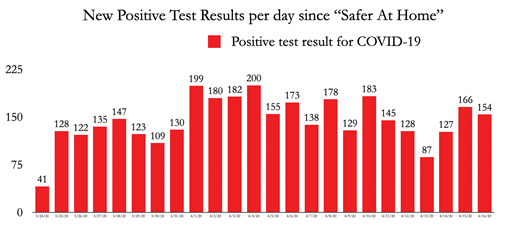
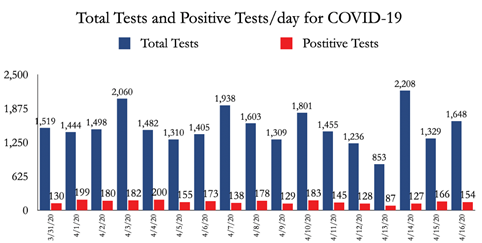
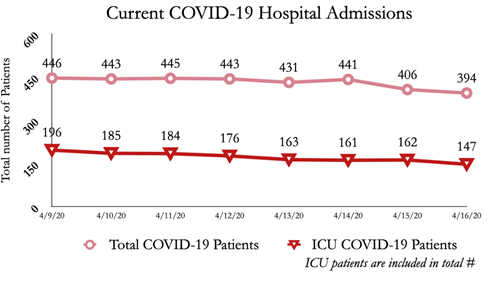
Cumulative Numbers:
